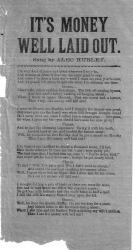
Handbill cockney street ballad entitled 'IT'S MONEY WELL LAID OUT. Sung by ALEC HURLEY.'
On one side of a piece of light-brown laid paper, dimensions roughly 240 x 125 mm. Text clear and entire, on lightly creased paper with chipping, short closed tears and loss to extremities. Crudely printed. A thirty-two line poem, arranged in four four-line stanzas, each with a different chorus. An excessively scarce piece of music hall ephemera. No other copy of this particular item, possibly produced for distribution to Hurley's music hall audience, is present on COPAC or anywhere on the web. The sheet music of the song, written by Harry Castling, and set to music by George Le Brunn, was published by Francis, Day & Hunter (1898). First stanza and chorus: 'I'm very fond of peace and quiet wherever I may be, | And tidiness at home it does my eye-sight good to see: | And when I've done a hard day's work I want my rest, you're sure, | And it's grand, it's great, to spot this when I'm entering our door. | Chorus. - | There's the missis making dumplings, The kids all singing hymns, | And last week's heavy washing all hanging about; | When I think to marry Hannah, Cost me seven and a tanner, | Then I say - it's money well laid out!' The cockney character of the piece is indicated by the following: 'I've treated our landlord to drinks a thousand times, I'll bet, | He's made attempts to treat me but 'e ain't been guilty yet; | The last time that I lushed him up, says 'e, "You're werry kind," | But never got his hand down once, though he got nearly blind.' Cockneyisms include 'blooming impudence', 'tanner', 'he pinched it', 'I've got a quid Wot I don't want to change', 'kept chucking his carcass about', 'Well, I spent three bob on liquor, But I done him for his ticker', 'these wuss worse for wear', 'I told the wife it's money frowed away upon the kid'.


